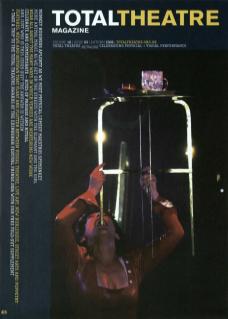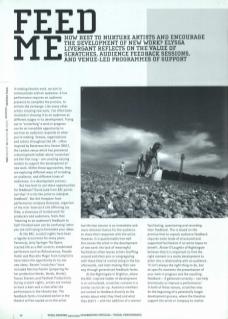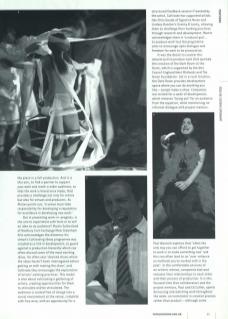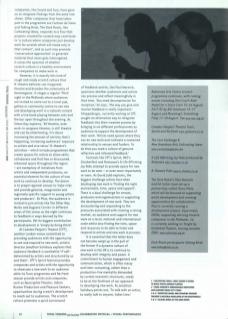In making theatre work, we aim to communicate with an audience. A live performance requires an audience presence to complete the process, to enliven the exchange. Like many other artists creating new work, I've often been involved in showing it to an audience at different stages in its development. Trying out or 'scratching' a work in progress can be an incredible opportunity to see how an audience responds to what you're making. Venues, organisations and artists throughout the UK – often inspired by Battersea Arts Centre (BAC), the London venue which has pioneered a development ladder where 'scratches' are the first rung – are creating varying models to support the development of new work. Within these approaches, they are exploring different ways of including an audience, and different kinds of audiences, in a development process.
But how best to use these opportunities for feedback? David Jubb from BAC points out that it is ‘for the artist to interpret feedback'. But Ant Hampton from performance company Rotozaza, organiser of the mini-festival A Life Affirming Joy Ride, a showcase of invited work for producers and audiences, feels that ‘listening to an audience's feedback to half-finished work can be confusing' when you are still trying to formulate your ideas.
At BAC, scratch nights have been a regular occurrence for many years. Famously, Jerry Springer The Opera started life as a BAC scratch; established performers such as Ridiculusmus, Kazuko Hohki and Marcello Magni from Complicite have taken the opportunity to try out new ideas. Recent ‘scratchers' have included Patrizia Paolini (preparing for her production Words, Words, Words), Tassos Stevens and Flywheel Productions. During scratch nights, artists are invited to have a beer and a chat after the performance in the theatre bar. The feedback forms circulated earlier in the theatre will be copied on to the artist but this bar session is an immediate and more informal chance for the audience to share their responses with the artist. However, it is questionable how well this serves the artist in the development of new work: the lack of meaningful facilitation often leaves artists shuffling around with their pint or congregating with those they've invited along in the bar afterwards, and later making their own way through generalised feedback forms.
At the Nightingale in Brighton, where the BAC-inspired ladder of development is re-articulated, scratches convene in a similar social set-up. Audience members are invited to feedback directly to the artists about what they liked and what they didn't – with the addition of a mentor facilitating, questioning and recording their feedback. This is based on the premise that to unpack audience feedback requires some mode of structured and supported facilitation if an artist hopes to benefit. Alister O'Loughlin of Nightingale believes that it is important to find the right moment in a work’s development to enter into a relationship with an audience. 'It isn't always the right thing to do, but at specific moments the presentation of your work in progress and the resulting feedback – if gathered correctly – can help enormously to improve a performance.’ In both of these venues, scratches may be the beginning of a potentially longer development process, where the theatres support the artist or company to realise the piece in a full production. And it is this aim, to find a partner to support your work and reach a wider audience, so that the work is heard once made, that provides a challenge not only for artists but also for venues and producers. As Alister points out, 'a venue must take responsibility for developing a reputation for excellence in developing new work’.
But in presenting work-in-progress, is the aim to experiment with form or to sell an idea to an audience? Martin Sutherland of Newbury Corn Exchange / New Greenham Arts acknowledges the dilemma: his venue's Cultivating Ideas programme was created as a link in development, to guard against a production hierarchy which can often discard some of the most exciting ideas. He often sees 'devised shows where the ideas haven't been interrogated before getting on with making the show', and Cultivate thus encourages the exploration of artists' working practices. This model is also about cultivating a gathering of artists, creating opportunities for them to stimulate and be stimulated. The audience is invited free of charge into a social environment at the venue, complete with free wine, with an opportunity for a structured feedback session if wanted by the artist. Cultivate has supported artists like Chris Goode of Signal to Noise and Lindsey Butcher of Gravity & Levity, allowing them to challenge their working practices through research and development. Martin acknowledges there is ‘a natural pull... to produce work' but the programme aims to encourage open dialogue and freedom for work to be provocative.
It was the desire to counter this natural pull to produce work that sparked the creation of the Dark Room at the Hurst, which is supported by the Arts Council England West Midlands and The Arvon Foundation. Set in a rural location, the Dark Room provides development space where you can do anything you like – except make a show. Companies are invited for a week of development, which removes 'trying out for an audience’ from the equation, while maintaining an informal dialogue with project mentors.
Paul Warwick explains that ‘often the only way you can afford to get together to work is to make something new' and this can often lead to an 'over-reliance on methods you've worked with in the past’. In the comfortable environs of an artistic retreat, companies test and reassess their relationships to each other and their process of production. It is this focused time that collaborators and the project mentors, Paul and Ed Collier, spend discussing and watching work throughout the week: an investment in creative process rather than product – although some companies, like Sound and Fury, have gone on to integrate findings from the week into shows. Other companies that have taken part in the programme are Cartoon de Salvo and Talking Birds. The Dark Room, like Cultivating Ideas, responds to a fear that projects created for scratch may contribute to 'a culture where companies just develop work for scratch which will stand only in that context', and as such may promote 'conservative approaches' or generate material that never gets interrogated. It raises the question of whether scratch culture is a healthy environment for companies to make work in.
However, it is exactly this kind of rough and ready scratch culture that B-theatre believes can invigorate theatre and broaden the community of theatregoers. It stages a regular 'Pilot’ night in the Midlands where audiences are invited to come out to a local pub, gallery or community centre to see new and developing work in a cabaret context with a live band playing between acts and the bar open throughout the evening. As Simon Day explains, 'All theatre, even work-in-progress theatre, is still theatre and can be entertaining. It's about increasing the amount of activity that's happening, increasing audiences' exposure to artists and vice versa.' B-theatre's activities – which include programmes that create spaces for artists to share skills, collaborate and find free or discounted rehearsal space throughout the region – are exemplary of initiatives from artists and independent producers, an essential element for the culture of new work to continue to develop. The desire is to propel regional venues to ‘take risks and provide genuine, imaginative and regionally specific support to young artists and producers'. At Pilot, the audience is invited to join artists like The Other Way Works and Augusto Corrieri in different areas of the venue as the night continues to feedback in ways devised by the participants. Yet its biggest contribution to development is simply by being there!
At Camden People's Theatre (CPT), another London venue committed to providing audiences with the opportunity to see and respond to new work, artistic director Jonathan Salisbury explains that audience feedback is worthwhile 'if self-determined by artists and structured by us and them'. CPT's Sprint festival provides companies and artists with the opportunity to showcase a new work to an audience while its Tonic programme and Re:fresh season provide artists and companies, such as Apocryphal Theatre, Indian Runner Production, and Pleasure Seekers, opportunities during a work's development to reach out to audiences. The scratch culture promotes a quick turnaround of feedback and he, like Paul Warwick, questions whether audiences and artists can process and reflect meaningfully in that time. ‘You need decompression for reception,' he says, 'the way you give and receive feedback is really important.' Chopped Logic, currently working at CPT, sought an alternative way to integrate feedback into their creation process by bringing in six different professionals as audience to support the development of their work. 'Artists need spaces where they can do new work and cultivate a sustained relationship to venues and funders. To do that you need a culture of genuine reflective and informed feedback.'
Festivals like CPT's Sprint, BAC's Octoberfest and Rotozaza's A Life Affirming Joy Ride attempt to provide space for new work to be seen – or even more importantly re-seen. As David Jubb explains, the biggest challenge artists face when developing new work is 'finding the right environment, time, space and support'. There is a dual challenge for venues, producers and organisations in supporting the development of new work. They are encountering and responding to the pressures associated with creating a strong market, an audience and support for new work on a local, national and international scale whilst also finding the time, space and resources to be able to listen and respond to artists and new work in process.
It is essential that the latter does not become swept up in the pull of the former if a dynamic culture of new work in the UK is to continue to develop with integrity and power. A commitment to human engagement and communication, which is often messy and time-consuming, rather than a production-line mentality demanded by current economic structures, needs to be at the forefront of our approach to developing new work. As Jonathan Salisbury points out, 'To talk with an artist, to really talk to anyone, takes time.'
Battersea Arts Centre Scratch programme continues, with coming events including Anti Cool's Role Model for a Store Clerk 15-16 August, 24/7/52 by Bill Aitchison 15-17 August and Moonhag's Something Fishy 17-18 August. See www.bac.org.uk
Camden People's Theatre, Tonic, Sprint and Re:fresh www.cptheatre.co.uk
The Corn Exchange & New Greenham Arts Cultivating Ideas www.cornexchangenew.com
A Life Affirming Joy Ride produced by Rotozaza www.rotozora.co.uk
B-Theatre Pilot www.b-theatre.co.uk
The Dark Room's Paul Warwick and Ed Collier have set up a partnership called China Plate which will be focused on supporting artist development and creating opportunities for collaboration. Paul is currently running a development project, Experiment; GROW, supporting devising theatre companies in the Midlands. Ed is currently working on Tangle by Unlimited Theatre, touring autumn 2006. www.unlimited.rek
Dark Room participants Talking Birds www.talkingbirds.co.uk



